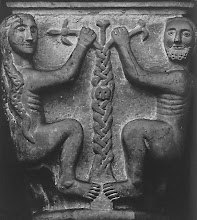(p. 73) “The Tempest—To my daughter Miranda,” Stephen Corey
If you name your daughter vision,
or wondrous to behold, your should not be surprised
if she comes to you in anger or in shame,
wishing to be known as Mary or Ann.
That will be the moment to carry her out
to the things of the world she is not,
speaking other sounds that were almost hers:
aspen, lily-white, cumulo-nimbus glow.
Soon enough she’ll realize the world,
too often, gets named in hope of profit,
or deceit, or the scientist’s exactitude.
But on the greening island of the family
testing its voice in the months of waiting,
the sought-after words are music and the past:
Grandparent. Aunt. Child deceased.
Spirits of fashion and monsters of commerce
lurk, bedfellows eager to keep us
from our own best inventions and songs.
Some days it seems we grow from wailing silence
into speech, only that we might curse
the coming return to silence.
But if you’ve named your daughter wondrous to behold,
she’ll someday learn she heard those words
before all others, and then again, and again.
When you are gone beyond all roaring
she’ll know, should you ever brave return,
which words are the first you’ll speak.
The middle stanza of this poem is boring to me, but I like the father’s insistence that his child is “wondrous to behold,” and the idea that the best thing for a child feeling so trapped within her given name is not a long argument about why she’s so wondrous, but just to be carried outside (outside herself?) to see all those other things “wondrous to behold” like aspens and lilies and glowing clouds. And I like the ending insistence that the first thing the father will say if he sees her after his death is still that she is “wondrous to behold.”
skip to main |
skip to sidebar


All text (excluding quoted poems and comments) within Matter | Pattern by Emma J is licensed under a Creative Commons Attribution-Noncommercial-Share Alike 3.0 United States License.
living with poetry
"Let our words be as necessary and useful as once were words of magic.
This is an unachievable ideal."
Anna Swir (1909 - 1984)
This is an unachievable ideal."
Anna Swir (1909 - 1984)
. . . . and elsewhere
Matter | Pattern

matter [ME matere, fr. OF matere, matiere, fr. L materia] tree trunk (<"matrix," the tree's source of growth) matter, subject, physical substance, wood for building, fr. mater mother
mother Based ultimately on the baby-talk form ma- 2 [Indo-European ma - 1 <"good" with derivatives meaning "occurring at a good moment, timely, seasonable, early, ripe" ; ma- 2 <"breast" an imitative root derived from the child's cry for the breast, a linguistic near-universal found in many of the world's languages; ma- 3 <"damp ") [ME moder, fr. OE modor, akin to OHG muoter, ON mothir, L mater (maternal, maternity, matriculate, matrix, matron), Gk meter (metro-, metropolis [<"mother city]; Demeter [< "god-mother"], Skt matr]
meter [ME meter, metre, fr. OE & MF, fr. L metrum, fr. Gk metron (<"measure" ) fr. IE root me-] meter, metrical, diameter, geometry, metronome. Suffixed forms mens, men-ot (<"moon, month") an ancient and universal unit of time measured by the moon (menarche, meniscus, menopause, menses, menstrual, bimester, semester, trimester).
poetry [fr. ME poet, poete fr. OF poete, fr. L poeta, fr. Gk poietes, poetes <"maker, composer, poet, fr. poien to make, do , create, compose"] akin to Skt cinoti <"he gathers, heaps up, piles in order," OSlav ciniti <"to arrange, to pile up"
padre from papa, a child's word for "father," a linguistic near-universal found in many languages. [IE root pa- <"to protect, feed" (fodder, forage, pabulum, food, foster, pasture, repast, pastor <"shepherd, protector") (ME fader, fr. OE faeder; akin to OHG fater, ON fathir, Goth fadar, L pater, Jupiter [<"god-father"], patrare [<"to bring about"]; Gk pater, Skt pitr) patrician, patrimony, patron, pater, paternal
pattern [ME patron, fr. MF, fr. L patronus (<"master, pattern") fr. L defender, protector, advocate, fr. patr-, pater (<"father") a fully realized form, original, or model accepted or proposed for imitation, archetype, exemplar.
mother Based ultimately on the baby-talk form ma- 2 [Indo-European ma - 1 <"good" with derivatives meaning "occurring at a good moment, timely, seasonable, early, ripe" ; ma- 2 <"breast" an imitative root derived from the child's cry for the breast, a linguistic near-universal found in many of the world's languages; ma- 3 <"damp ") [ME moder, fr. OE modor, akin to OHG muoter, ON mothir, L mater (maternal, maternity, matriculate, matrix, matron), Gk meter (metro-, metropolis [<"mother city]; Demeter [< "god-mother"], Skt matr]
meter [ME meter, metre, fr. OE & MF, fr. L metrum, fr. Gk metron (<"measure" ) fr. IE root me-] meter, metrical, diameter, geometry, metronome. Suffixed forms mens, men-ot (<"moon, month") an ancient and universal unit of time measured by the moon (menarche, meniscus, menopause, menses, menstrual, bimester, semester, trimester).
poetry [fr. ME poet, poete fr. OF poete, fr. L poeta, fr. Gk poietes, poetes <"maker, composer, poet, fr. poien to make, do , create, compose"] akin to Skt cinoti <"he gathers, heaps up, piles in order," OSlav ciniti <"to arrange, to pile up"
padre from papa, a child's word for "father," a linguistic near-universal found in many languages. [IE root pa- <"to protect, feed" (fodder, forage, pabulum, food, foster, pasture, repast, pastor <"shepherd, protector") (ME fader, fr. OE faeder; akin to OHG fater, ON fathir, Goth fadar, L pater, Jupiter [<"god-father"], patrare [<"to bring about"]; Gk pater, Skt pitr) patrician, patrimony, patron, pater, paternal
pattern [ME patron, fr. MF, fr. L patronus (<"master, pattern") fr. L defender, protector, advocate, fr. patr-, pater (<"father") a fully realized form, original, or model accepted or proposed for imitation, archetype, exemplar.
Blog Archive
-
▼
2007
(31)
-
▼
November
(25)
- “Winter Verse for His Sister,” by William Meredith
- from "Three Poems for a Twenty-Fifth Anniversary,"...
- “Sent to Her Elder Daughter from the Capital,” by ...
- “September, the First Day of School, #1,” by Howar...
- “For a Five-Year-Old,” by Fleur Adcock
- “Night Terrors,” by Alan Shapiro
- “Instinct,” by C.K. Williams
- "To my Daughter" by Stephen Spender
- "A Cradle Song" by W.B. Yeats
- "The Tempest - to my daughter Miranda" by Stephen ...
- "Morning Song" by Sylvia Plath
- "Five a.m., the Ninth Month" by Jacqueline Osherow
- "After Midnight, the Fifth Month" by Jacqueline Os...
- "Infertility" by Edward Hirsch
- "My Husband before Leaving" translated by J. Mouss...
- "Lesson" by Forrest Hamer
- "Letter of Recommendation" by Yehuda Amichai
- "Those Winter Sundays" by Robert Hayden
- "I Ask my Mother to Sing" by Li-Young Lee
- "Clearances" by Seamus Heaney
- "Portrait of my Mother on Her Wedding Day" by Celi...
- "The Journey," by David Ignatow
- "Nikki-Rosa," by Nikki Giovanni
- A Poem a Day for 30 Days: #1“There Was a Child Wen...
- Where I'm Coming From: Biases and Blindspots
-
▼
November
(25)
I am

All text (excluding quoted poems and comments) within Matter | Pattern by Emma J is licensed under a Creative Commons Attribution-Noncommercial-Share Alike 3.0 United States License.

